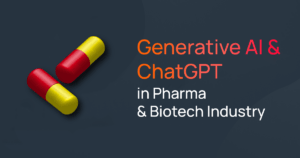Artificial Intelligence technology holds tremendous potential for transformation in the biotech and pharmaceutical sectors. Particularly, Generative AI offers transformative solutions for drug discovery within pharma and biotech industries.
By leveraging complex algorithms, Generative AI predicts molecular behavior and fine-tunes their effectiveness, thus reducing costs and enhancing the predictability of experiments.
In this article, we’ll delve into specific strategies these industries can employ to harness Generative AI’s capabilities in the pharma industry. We’ll investigate its current use cases, prospective future applications, and its potential to reshape business operations and research methodologies.
What is Generative AI?
According to the glossary of AI terms, Generative AI is a subset of Artificial Intelligence. It’s built on large language models (LLMs), which are algorithms trained to generate relevant content by “learning” information from millions of pre-existing examples.
When a user submits a query to a Generative AI tool, the algorithm uses what it knows to construct a personalized response. It’s essentially an advanced form of predictive text. The result is a humanlike response as opposed to something that looks like it was generated by a robot.
Although Generative AI tools are often used to get simple answers, detailed and specific queries can generate longer and more thorough responses.
Where does Generative AI Fit into Pharma Companies?
Utilizing deep learning algorithms and neural networks, Generative AI, a sophisticated class of Large Language Models, has the remarkable capacity to generate fresh, original content. Originating from relatively rudimentary applications in the 1950s, it has undergone a significant evolution. Owing to the exponential growth in data availability and computational power, its applications have dramatically diversified and complexified.
The McKinsey Global Institute estimates that this technology could generate between $60 billion and $110 billion annually in economic value for the pharmaceutical and medical products industries.
Generative AI fits seamlessly into pharmaceutical companies by enhancing key stages of the drug development process. Its capabilities in data analysis and pattern recognition allow for more efficient screening of vast chemical libraries, pinpointing compounds with potential therapeutic effects more rapidly than traditional methods.
Generative AI supports the design phase, where it can propose novel drug molecules and predict their interactions with biological targets, thus accelerating the transition from conceptual frameworks to preclinical testing.
Additionally, Its capabilities exemplify the power and potential of Generative AI in transforming communication and user experiences for customer support purposes.
By integrating Generative AI, pharma companies can not only expedite the discovery and development of new drugs but also improve the precision and reduce the costs associated with bringing effective treatments to market with an AI-enhanced customer experience.

Generative AI Use Cases in Pharma and Biotech
Some biotech companies are already using Artificial Intelligence in their quest to find new drugs and Generative AI platforms create a more user-friendly interface between workers and their discovery systems. These systems are often complicated and require endless clicking and reading to find information.
By leveraging Generative AI to search the discovery system’s database, information is gathered and presented to the user in a simpler, easy-to-read manner. Drug hunters can especially benefit from a Generative AI simply because of the sheer amount of information they need to sift through to do their job.
For instance, when looking at graphs that show genes that interact with certain substances, engaging a conversational AI makes their task easier and more enjoyable. They can ask the Gen AI platform how many genes are in a particular graph, find associations between genes and diseases faster, provide information, and ask even more detailed questions to get information instantly.
AI-assisted drug discovery shows the potential to be more efficient, predictable, and cost-effective than the traditional model. The key to making Generative AI work in this industry lies with training, and so far, some drug discovery companies have made it work well.
In fact, one company has used an Artificial Intelligence model to design proteins that kill E. coli bacteria. The amino acid sequences differ from natural proteins, but they fold in the same way. Here’s a deeper look at some of the best use cases for Generative AI in the biotech and pharmaceutical industries:
What is the Role of Generative AI in Drug Discovery
Generative AI is revolutionizing the pharmaceutical and biotech industries by streamlining and accelerating the drug discovery process. Its ability to analyze vast amounts of data and predict molecular behavior has made it an invaluable tool in the creation of new and more effective treatments.
Accelerating Drug Discovery with Generative AI
Typically, creating new drugs is a time-intensive process that requires testing millions of compounds. Generative AI models can help drug hunters create the exact molecules they need much faster. By leveraging complex machine learning algorithms, Generative AI analyzes vast amounts of data, utilizing predictive modeling and virtual screening to identify potential drug candidates efficiently.
For instance, if researchers need a molecule that is easily absorbed, Generative AI can help them find it quickly by analyzing molecular structures and predicting their biological activity. This process reduces the time and costs associated with traditional drug discovery methods.
Generative AI also has the potential to help drug hunters make existing molecules safer and more effective or create entirely new compounds. AI-powered algorithms can facilitate the design of novel therapeutics with enhanced efficacy and safety profiles.
We’ve seen many instances where AI is used to create drugs that are being tested in the trial stage. However, this is the first time a finished medicine made by AI has been reported by Clinical Trial Arena. The exciting news is that InSilico Medicine, a company in Hong Kong, has used this technology to make a new drug called INS018-055. This drug is for treating a lung disease called idiopathic pulmonary fibrosis (IPF).
Provide Fast Access to Drug Information
Physicians get information about new and existing drugs from various sources, including their colleagues, journals, direct mail, pharmaceutical reps, hospital clinical meetings, and lectures. Reliability aside, all of these sources take time to access.
With Gen AI, a physician could type a simple prompt asking for information about a drug, its indications, and contraindications, and ask if it’s been black-boxed. The chatbot would return the relevant information almost immediately.
Provide Easy Access to Clinical Studies & Patient Data
Clinical studies play an important role in how a doctor prescribes medication to patients. Doctors need to know a drug is relatively safe – along with potential side effects – before prescribing it to anyone. Sometimes doctors discover new drugs because they come across a clinical trial.
The problem is that doctors are on their own to research clinical trials. If they don’t know the name of a drug, they have to search for the clinical trial data or trials conducted based on symptoms, specific illnesses, and other phrases.
There are online search tools run by organizations like the National Institutes of Health (NIH), but they’re not powered by Generative AI. This means physicians need to know exactly what keywords to type in to get the results they want.
With a Generative AI chatbot, they can ask natural questions and get information without knowing every single related keyword.
Precision Medicine and Drug Optimization with Generative AI
Generative AI is at the forefront of transforming personalized medicine and drug optimization in the pharmaceutical and biotech industries. By integrating complex datasets and leveraging advanced algorithms, Generative AI enables the creation of more effective and individualized treatments.
– Personalized Medicine
One of the most promising applications of Generative AI in healthcare is the advancement of precision medicine. AI integrates patient data, including genomics, proteomics, and clinical records, to identify personalized treatment strategies tailored to individual patients. This approach improves treatment outcomes by optimizing drug selection and dosage based on patient’s unique genetic makeup and disease characteristics.
– Drug Optimization
Once a drug candidate is identified, Generative AI can be used to design similar molecules with more desirable properties. This optimization process ensures that the drug is not only effective but also safe and well-tolerated by patients. AI-powered algorithms facilitate the design of novel therapeutics with enhanced efficacy and safety profiles, making the drug development process more efficient.
– Repurposing Existing Drugs
Generative AI also plays a crucial role in drug repurposing, where existing drugs are explored for potential new uses. By analyzing large-scale biomedical datasets, Generative AI can identify drugs that may be effective for different indications, thus expediting the drug development process and maximizing the therapeutic potential of existing medications.
– Personalized Treatments
Generative AI enables the creation of personalized treatments for specific patient groups or even individual patients. For instance, if a particular group of patients requires a specific therapeutic effect, Generative AI can assist in identifying or creating a special molecule to serve that purpose. Additionally, AI can help eliminate side effects for individual patients by designing molecules tailored to their unique needs.
– Enhancing Clinical Trials
During clinical trials, new drugs are tested for safety and efficacy before approval. Generative AI can increase the efficiency of these trials by identifying groups of people who are more likely to respond favorably to the drug. By finding participants with specific genetic markers, Generative AI helps ensure that clinical trials are more effective and streamlined, ultimately accelerating the path to market for new treatments.

De Novo Drug Design Approach
The de novo drug design approach involves creating entirely new molecules from scratch, tailored to target specific biological structures or pathways. This method leverages advanced computational algorithms and vast chemical databases to predict and generate novel compounds that exhibit desired therapeutic properties.
By bypassing the need for existing chemical templates, de novo design can uncover unique and effective drug candidates more efficiently, accelerating the drug discovery process and potentially leading to breakthroughs in treating various diseases.
Other Applications of Generative AI in Biotech
Support the Public’s Need for Information
Many people research drugs on their own, so having a Generative AI chatbot available to the public would greatly improve the patient experience. Hospitals and physicians could offer this kind of tool on their website for patients and drug companies could do the same.
Patient Support Services
- Care Management: Provides comprehensive patient support with the power of AI Customer Care, including instructions on the Food and Drug Administration (FDA), managing side effects, and guidance on using specific medical devices.
- Clinical Support: Keeps the clinical support team informed with the latest product updates and FAQs to effectively address patient questions and concerns.
Operational Efficiency
- Technical Support Inquiries: Offers assistance to medical staff with IT and interdepartmental requests, such as setting up new accounts, resolving connectivity issues, and updating benefits or profile information with the power of AI Service Desk.
- Appointment Scheduling and Reminders: Manages scheduling of appointments and sends proactive notifications about upcoming therapy sessions and prescription refills.
Financial and Feedback Services
- Patient Financial Aid Assistance: Provides patients with information on financial assistance programs, including eligibility and enrollment criteria is.
- Customer Feedback Management: Gathers confidential patient feedback and responses through multiple channels, including in-app surveys and feedback forms.

Challenges of Using Generative AI in Pharma
Aside from the possibility of error, there are some challenges to using Generative AI in the biotech and pharmaceutical industries. For instance, Generative AI doesn’t exactly work out of the box.
Technically, anyone can type into a chat box and receive a response, but that doesn’t necessarily provide usable results. To get value from this technology, prompts need to be carefully and intentionally crafted to elicit optimal responses.
Some basic challenges include:
Data quality. Generative AI only works because it uses existing data as training. If the input is poor, the output will be poor and might generate poor models and inaccurate predictions.
Complexity. Getting approvals in these industries is a requirement, but since Generative AI is hard to explain, this could create roadblocks. At least until a few companies create an explanation that can be used as a general template for others.
Misuse. Although personalized drugs are a good thing (for those people), they could become controversial if too many people are excluded. For instance, a drug created to treat a specific disease should ideally work for everyone, but Generative AI might be used to make such a drug that only works for people with certain genetic markers.
Privacy. At some point, if any patient information is entered into a prompt, this could create a legal problem under HIPAA and other data privacy regulations. Private health information must be protected at all times, and whether a Generative AI platform processes or stores prompts, the entire web server and all software involved will need to be HIPAA-compliant.
Implementing responsible AI practices ensures that these systems not only comply with legal requirements but also uphold ethical standards by prioritizing patient privacy and data security.
Another potential business challenge is getting access to a Generative AI system that has access to the right database of information. This can be costly to create on your own, but thankfully, companies are creating Generative AI systems specifically to serve the biotech and pharmaceutical industries.
Conclusion
By now, the benefits of using Generative AI, like AiseraGPT, in the biotech and pharmaceutical industries should be clear. If you haven’t checked out what this technology can do for your company, now is the perfect time to find out.
If you’re ready to take your pharma business to the next level and provide personalized care, get started with Generative AI to support your staff and customers. Generative AI platforms transform the pharma and biotech sectors. Book a custom AI demo to experience the power of Generative AI today!

